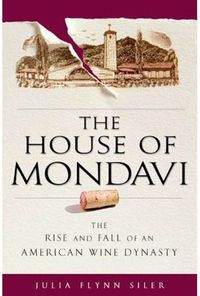 By Evan Dawson, Finger Lakes Correspondent
By Evan Dawson, Finger Lakes Correspondent
The other day I had a conversation with a friend and we tried to answer this question: If a winemaker can truly say that he or she focuses on quality, and carefully tends the grapes and makes the wine, how many cases (in terms of production) is realistic? Five thousand annually? Seven thousand? Ten thousand? Twenty? We went back and forth, as there isn't a concrete answer. But I can say without hesitation that 1.2 million cases of wine was not in the ballpark of "quality."
All of which is to say, reading the life story of the Mondavi family is like reading about a sect of aliens making wine on Saturn (which, if you listen to Michael Mondavi, might happen sooner than later at his family's urging). As a Finger Lakes wine writer, it is hard to imagine one operation making millions of cases of wine each year, and it is ludicrous to hear the Mondavis talk about making millions of cases of wine while still focusing on quality. But such is the story of an American wine dynasty in Julia Flynn Siler's "The House of Mondavi" (Gotham Books, New York).
At nearly 400 pages, the book reads surprisingly quickly thanks to Siler's deft handling of a wide range of subjects. She captures the drama of a self-destructive family, and she uses her skills as a Wall Street Journal reporter to convert banal financial details into a riveting plot. While occasionally lacking in her prose, Siler delivers the necessary pace to keep the reader hungry for the next plot turn. And there are a myriad of twists and turns, as the Mondavi family takes the brakes off their avarice-laced wine freight train.
The forced sale of Mondavi to Finger Lakes-based Constellation Brands is instructive. Siler writes that before acquiring Mondavi, Constellation was known for making "gutter wines" and used the sale to raise their profile in the fine wine business. Then, immediately after the sale goes through, we learn (or perhaps I should say our suspicions are confirmed) that Constellation immediately cuts staff and makes decisions aimed at improving the bottom line at the assumed expense of quality. Fine wine, indeed.
Given Siler's description of Constellation, consumers of New York state wines should be relieved that Constellation has declined to pursue the best producers in the local industry. And, given production volumes, why would they?
My biggest complaint is that Siler fails to capture the true desires of each Mondavi family member, with the exception of Timothy, who was the only one fighting for smaller production and higher quality. We're left to assume that Robert and Michael loved the venal thrill of global wine dominance, but we're never allowed to find out if they truly love wine. I kept waiting to hear Michael explain what kinds of wine inspired him, what individual wine experiences stayed with him. Perhaps there is not much to say in this regard; Siler portrays Michael as a narcissistic businessman who eschews quality for dollars, and I just wonder if he were always that way.
Cheers to Julia Flynn Siler for a thorough and enjoyable read. And cheers to our small producers who can say with straight faces that quality remains a driving force.
